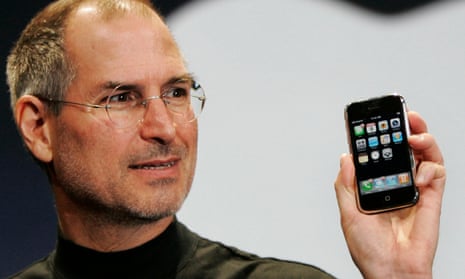My 16th birthday was a big deal. Not only was I allowed to throw a party at my dad’s, I was also given a brand new mobile phone. I was giddy. Back in 2006, nothing said liberation to a teenager quite like unlimited texts and a free house.
My friends and I set about creating the sort of chaos only a group of repressed teenagers yet to be fully exposed to the unadulterated excesses of the internet could. Little did we know that those heady days of pumping out noughties R&B from an iPod were to be some of the last of their kind. Just a few months later, Steve Jobs would unveil the first iPhone, altering the way we interact with ourselves and the world around us for ever.
I can’t pinpoint the exact moment I became addicted to my phone. It happens without you noticing, like a frog slowly boiling in a pot. I always told myself my excessive screen time wasn’t a big deal, that my life was better with my phone in it. I made every excuse in the book: I was learning new things, keeping my finger on the pulse, being an efficient employee and staying up to date with the people I love.
But in reality, none of that was true. My phone was such a powerful drug precisely because it gave me the illusion that it held infinite possibilities. But my experience of time and culture had slowly become flattened into two-dimensional memes and philosophical quotes, and I would bypass anything real – messages unanswered, calls unreturned – in favour of getting the next hit of dopamine. I found myself numb, disconnected from the world around me and unable to concentrate on anything for longer than a few minutes.
At the peak of my addiction, I would sit in the bathroom for hours after my wife had gone to bed, mindlessly scrolling, until I’d look up and realise another evening had slipped away, and all I had to show for it was a stiff neck and a sore thumb. By this point, the screen had become an escape from feelings of self-hate, and I knew something had to change. So I turned to the only resource I thought could help me.
There’s a certain irony in thinking that the solution to a problem with phone addiction can be found on your phone. But that’s the insidiousness of the whole thing. I set time limits, sought out podcasts and resources on how to claim back my attention. I had my wife apply a password to any app that wasn’t deemed “essential”. But in every instance, I found a way round it. And without immediate access to social media, I found myself scrolling through anything I could get my thumb on: photos, notes – even the weather app.
I knew I needed to make a more drastic decision. If I wanted to break the addiction, I decided my smartphone had to go. I had my reservations. How would I do my job? What if I missed an important call? What about my WhatsApp groups? But the ingrained belief that I couldn’t function, and wouldn’t truly exist without a smartphone was precisely what I needed to challenge – if only for my own sense of self.
I bought a Nokia flip phone with no internet and no WhatsApp, and immediately transferred my sim card. I gave out my home phone number to the few people I spoke to regularly, warned all my friends that I might be slow to reply, and put my smartphone in a drawer.
Unsurprisingly, the results were instant. Perhaps I was riding a wave of enthusiasm that came from simply taking action, but I immediately found myself in control of my attention, like I was waking up to the world after a decade-long sleep. I became comfortable with silence, I could hear myself think, and, for the first time in months, I had a proper conversation with my wife over dinner. And no – I didn’t know what boots my old schoolfriend’s workmate was going to wear to five-a-side that weekend; but it turns out the conversations that truly matter find a way of happening regardless.
But even though I felt so much better, it was hard to live offline. Online banking, login access codes, cyber-verification – in the eyes of many, it turned out, I actually didn’t exist without a smartphone. Each time I retrieved it from the drawer, it would stay in my pocket a little longer than the last time. The modern world just isn’t set up for non-smartphone users, but just a few months of space allowed me to reframe my relationship with mine. And now my Nokia and my smartphone hold equal footing in a deliberate rotation that allows me to function as a productive member of society – but switch off whenever necessary.
Occasionally I stop and think about how drastically the world has changed since 2006, in many ways for the better. The iPhone has framed almost every memory I have of my adult life. What’s changed, too, is my perception of freedom. Sometimes I wonder who’s more free – me now, with the whole world at my fingertips, or my teenage self. My world was unquestionably smaller, but perhaps I was able to experience more of it on my own terms. I suppose there’s no knowing who I’d be if smartphones hadn’t altered life so enormously. But I do know that experiencing the world through the filter of a screen doesn’t do it justice.
-
Will Clempner Clarke is a writer and digital producer originally from Manchester, now based in Somerset

